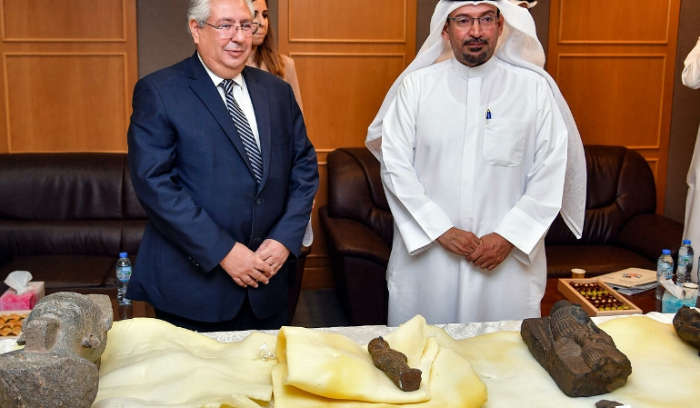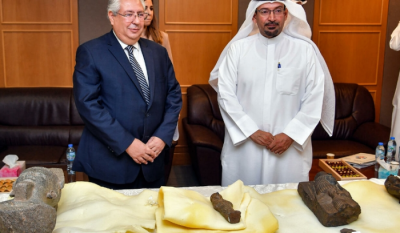Kuwait has returned a collection of antiquities to Egypt based on a decision from the Public Prosecution. The Kuwait Customs had seized these pieces in 2019 from a traveler arriving on a direct flight from Luxor to Kuwait, according to the "French Press Agency."
Director of the Department of Antiquities and Museums at the Kuwaiti National Council for Culture, Arts and Letters, Sultan Al-Mutlaq Al-Duwaish, stated after handing over the artifacts to the Egyptian ambassador in Kuwait, Osama Shaltout, that this is the second time the Gulf state has returned smuggled Egyptian artifacts. He explained to reporters, "In 2018 we returned a coffin lid, and today we are handing over five antiquities that customs officials identified, which were confirmed to be original by experts from the University of Kuwait specializing in Egyptian civilization, although there are doubts regarding the authenticity of the remaining two pieces."
The artifacts include four statuettes of various sizes, in addition to a stone plaque divided into three parts.
Meanwhile, the Egyptian ambassador told reporters during the transfer of the antiquities at the National Museum of Kuwait that these pieces will return to Egypt today and will undergo further examinations to determine their significance, while the Egyptian judiciary investigates how they were smuggled out of the country.
This development occurs amid a case involving the smuggling of Egyptian artifacts worth millions of dollars, including those related to the Louvre Museum in France and the Louvre Abu Dhabi.
Earlier this month, the Public Prosecution in New York seized five Egyptian antiquities that were in the possession of the prestigious Metropolitan Museum in New York, which are suspected to originally be stolen pieces.
This move marks a new development in the ongoing investigation being conducted by French authorities concerning the smuggling of antiquities, which involves the former director of the Louvre Museum.
The inquiry reveals a vast network involved in smuggling artifacts from the Near and Middle East, highlighting a growing illegal trade that has expanded significantly since the "Arab Spring," according to specialists consulted by the "French Press Agency."
At the heart of this smuggling activity are items plundered from archaeological sites, including tombs that resemble "real outdoor supermarkets," in "countries suffering from war or political turmoil," such as Syria, Iraq, or Egypt, but "also in Latin America and Africa," as stated by the Eastern Archaeology professor at the University of Poitiers, Vincent Michel, to the agency.
While it is impossible to estimate the value in numerical terms, the global trade in smuggled antiquities involves items worth "tens of millions or even hundreds of millions" of dollars.




